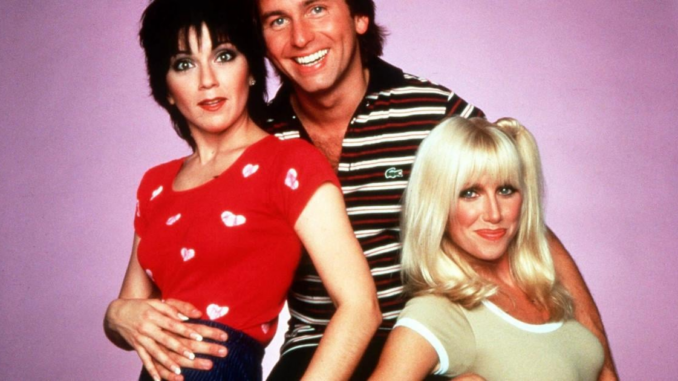
Flashback to March 15, 1977. ABC comedies Happy Days and Laverne & Shirley led the rating charts. Crime solvers Charlie’s Angels and Baretta and two movie nights were also perennial top 10 rated ABC entries. And the alphabet net was about to add two new long-running hits to its roster: sitcom Three’s Company and family dramedy Eight Is Enough, which both premiered on this day exactly 48 years ago.
Competitors CBS and NBC cornered the TV market on family-themed storytelling care of period pieces The Waltons and Little House on the Prairie. Now ABC wanted to capitalize on the genre, only this time with the modern day telling of a loving family with eight children dealing with the realities of life at the time in Sacramento, California.
Both Three’s Company and Eight is Enough were immediate hits in their abbreviated first seasons, but it was Three’s Company that roared right to the top of the charts. By season two it finished third overall behind Laverne & Shirley and Happy Days.
Television at the time was smack in the Norman Lear era, where comedies like All in the Family, Maude, Good Times, The Jeffersons and One Day at a Time were tackling then taboo topics like racism, antisemitism, homosexuality, women’s liberation, abortion, infidelity, menopause, poverty, and the Vietnam War. But Three’s Company was the first comedy to feature two single women (Suzanne Somers as Chrissy Snow and Joyce DeWitt as Janet Wood) sharing an apartment with a single man (John Ritter), with Ritter’s Jack Tripper pretending to be gay to avoid clashing with cantankerous landlord Stanley Roper (Norman Fell). The sitcom’s success was fueled by the sexual innuendo and slapstick humor surrounding every situation, including Audra Lindley as Stanley’s sexually frustrated wife, Helen Roper.
Unlike the Norman Lear entries, the comedy on Three’s Company was not topical. Each episode was “comedy of errors” of sorts with some misunderstanding until the cast finally recognized the misjudgment and all returned to normal. Case point: Mr. Roper eavesdrops on the trio and comes to the conclusion that Chrissy is pregnant when all she was talking about was a wart on her finger.
Prior to Three’s Company, John Ritter has the recurring role of kindly Reverend Matthew Fordwick on The Waltons.
“I recall the conversation I had with John the day he got the offer to Three’s Company,” said Richard Thomas, who played oldest son John Jr. (“John Boy”) on The Waltons. “He wasn’t sure he wanted to take the risk, and I suggested that comedy would be a great segue from who viewers were accustomed to seeing him as. I told him to go for it.”
Needless to say, John Ritter made the right career decision.
Behind the scenes, there was also controversy surrounding Three’s Company. In 1980, season five, Suzanne Somers requested a salary increase to match other male TV stars of the time, which meant asking for $150,000 an episode, up from $30,000 an episode (plus a piece of the show’s backend profits). Instead of negotiating, the producers fired Somers, and she was not allowed to interact with the rest of the cast, with her scenes limited to awkward phone conversations filmed at the end of her final episodes.
Midway through season five, the character of Chrissy was replaced, first by inexperienced Jenilee Harrison as her cousin Cindy Snow, and then by Priscilla Barnes as new roommate Terri Alden. But, from a quality standpoint, the so-called “magic” was gone. Norman Fell and Audra Lindley also exited one season earlier for failed spinoff The Ropers and was replaced by Don Knotts as Ralph Furley, the new landlord.
Despite the cast changes, Three’s Company remained in the top 10 through the end of season seven. When ratings softened in the final eighth season, the network shipped John Ritter off into spinoff Three’s a Crowd, which now featured Ritter’s Jack Tripper living with his new girlfriend, Mary Cadorette as Vicky, as the pair dealt with Vicky’s obtrusive father James (Robert Mandan). It lasted just one season.
Forty-eight years later, Three’s Company, no doubt, is considered tame in comparison to the content exhibited in later decades. In some ways, perhaps, the anti-gay comical commentary against Ritter’s Jack Tripper by Norman Fell’s Stanley Roper and Don Knotts’ Ralph Furley feels dated and awkward to revisit. But the humor behind Three’s Company was within the silliness spiced with sexual innuendos. And it is easy to see why Three’s Company became such a monster hit.





